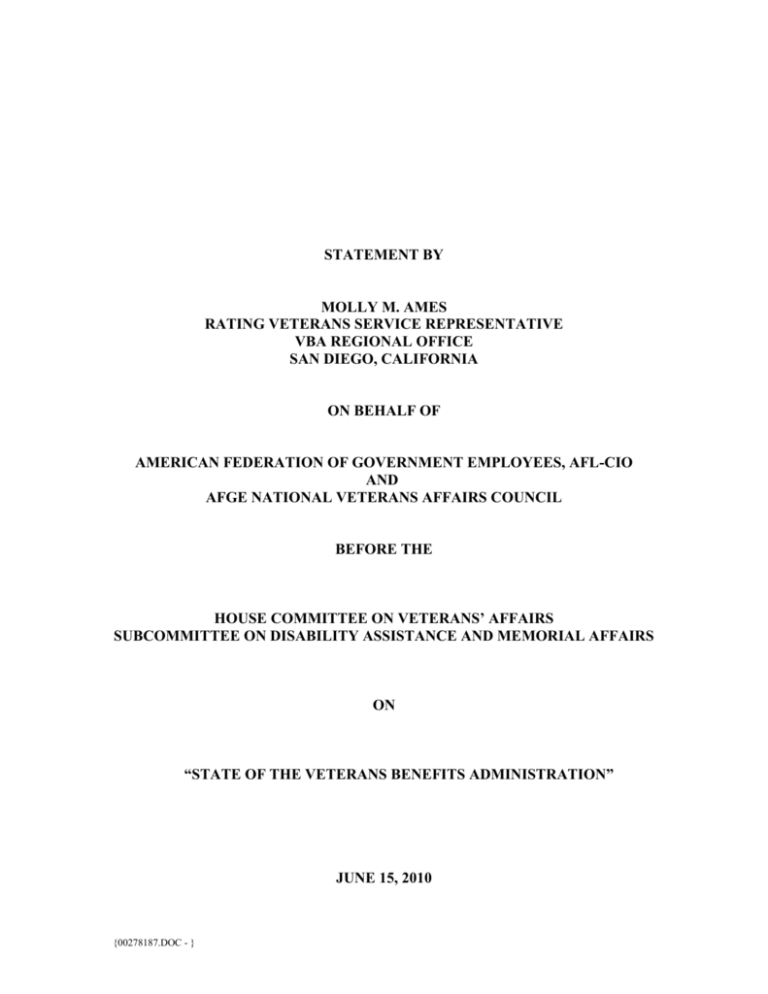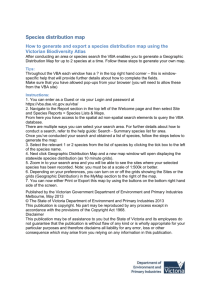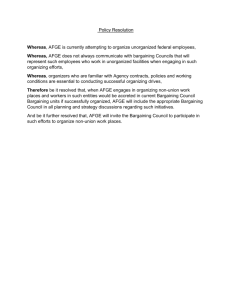State Of The Veterans Benefits Administration
advertisement

STATEMENT BY
MOLLY M. AMES
RATING VETERANS SERVICE REPRESENTATIVE
VBA REGIONAL OFFICE
SAN DIEGO, CALIFORNIA
ON BEHALF OF
AMERICAN FEDERATION OF GOVERNMENT EMPLOYEES, AFL-CIO
AND
AFGE NATIONAL VETERANS AFFAIRS COUNCIL
BEFORE THE
HOUSE COMMITTEE ON VETERANS’ AFFAIRS
SUBCOMMITTEE ON DISABILITY ASSISTANCE AND MEMORIAL AFFAIRS
ON
“STATE OF THE VETERANS BENEFITS ADMINISTRATION”
JUNE 15, 2010
{00278187.DOC - }
Chairman Hall, Ranking Member Lamborn and Members of the Subcommittee:
Thank you for the opportunity to share the perspective of the American Federation
of Government Employees (AFGE) and the National Veterans Affairs Council (VA
Council), the exclusive representatives of front line employees of the Veterans Benefits
Administration (VBA).
I have been employed with VBA since 1997. I currently serve as a Rating Specialist
(RVSR) at VBA’s San Diego Regional Office (RO). Previously, I worked as a Claims
Assistant and Veterans Service Representative (VSR).
AFGE and NVAC are extremely frustrated with VBA’s extreme delay in
implementing key provisions of P.L.110-389 that, if implemented properly, have the
potential to significantly reduce the current inventory and ensure that more claims are
processed correctly the first time. The following are our specific concerns and
recommendations.
Listening to Front Line Employees and Their Representatives
AFGE and NVAC greatly appreciated Chairman Hall’s request for our views during
the drafting of the P.L.110-389 and our views on implementation of the law at recent
hearings. In contrast, VBA has largely excluded AFGE and NVAC from its efforts to
implement provisions of this law that directly impact the ability of front line employees
to do their jobs, including skills certification, training and the work credit system. We
appreciate some recent efforts by VBA to solicit input from employees and their
representatives and hope this is the start of a more inclusive atmosphere.
AFGE and NVAC urge the Subcommittee to increase the frequency of its site visits
to the ROs, to include opportunities for unfiltered discussions with employees and
their representatives outside of the presence of management.
{00278187.DOC - }
Addressing Hostile Work Environments
Labor-management relations at many ROs have deteriorated significantly, resulting
in a work environment that is more hostile now than under the prior
Administration. Terminations of both experienced employees and newly trained
employees are a routine occurrence. Local AFGE officers in a number of offices have
been retaliated against for permissible union activity. Management recently singled out a
VSR with valuable skills and experience and refused to allow her to join her colleagues
in working overtime on the claims backlog simply because of her status as a local
president with official time.
The constant threat of termination places additional stress on a workforce that is
struggling to comply with arbitrary increases in production requirements, despite
mandatory overtime every weekend.
It is equally discouraging that VBA is unwilling to proceed with regional and local
labor management forums mandated by the December 2009 White House Executive
Order on labor-management forums. These forums offer a valuable opportunity for labor
and management to work together on effective solutions to the claims backlog.
Quality Assurance
Section 224 of P.L. 110-389 (Section 224) provides for a third party assessment of
VBA’s Quality Assurance program. The input of front line employees and their
representatives will be an essential component of any such assessment. Pressured RO
managers have resorted to a number of techniques for hiding the size of the backlog and
the number of aging claims. Our members on the front lines see how these techniques are
employed on a daily basis.
Also, many managers lack sufficient experience and subject matter expertise to carry
out quality assurance duties, leading to greater errors, which in turn lead to more appeals,
remands and other delays.
For example, at the San Diego RO, employees who have been rating cases less than
two years are overseeing the work of new employees, and others with less than two years
{00278187.DOC - }
of experience are training new RVSRs. Given the enormous, recent growth in our
workforce --from 150 to 500 employees in a just a few years at the San Diego, RO -- a
sufficient level of experience is no longer there.
VBA should implement skills certification tests for quality assurance personnel,
similar to those required under P.L. 110-389 for direct supervisors of claims
processors. More generally, management’s performance measures should include
quality of training and compliance with training requirements
Skills Certification Testing for Managers
We strongly support the requirement in the new law that managers pass the skills
certification tests similar to those required of claims processing personnel. Our members
regularly report that they are supervised by managers who have little or no experience
performing the complex functions involved in processing disability claims, rendering
their roles as mentors and trainers ineffective.
Lack of management expertise also takes a toll on workplace morale. Front line
employees facing intense production pressures have to answer to supervisors who have
not experienced these demands firsthand.
To date, front line employees and their representatives have had very limited
involvement in the development and administration of skills certification tests, despite
substantial evidence that the test does not properly measure needed skills and repeated
incidence of testing problems.
{00278187.DOC - }
All managers, including higher levels management and those involved in quality
assurance, should be required to pass supervisor skills certification tests.
Training: Shortcuts and Poor Quality Remain the Norm
Our members report a wide range of deficiencies in the training provided at ROs.
Most problematic: widespread training shortcuts for new and experienced employees.
After new employees complete their initial classroom training, their on-the-job training at
the RO is routinely cut short to rush them into production. It is also common for new
employees to be kept at one station to maximize their short term productivity, thus
depriving them of exposure to other skill areas that are need for their long term
productivity.
At the San Diego RO, most of the temporary one-year hires who have been
converted to permanent C&P employees have only received in-house training and are not
being rotated; the lack of initial training and exposure to other teams will deprive them of
critical skills in the long term.
Similarly, experienced employees are routinely deprived of their full 80 hours of
annual mandatory training by pressured managers who have significant discretion as to
how much training time is allowed. We receive regular reports of "training by email",
where employees are permitted a fraction of the time that was officially allotted to learn a
new concept, and deprived of the opportunity to learn face-to-face from experienced
instructors.
RVSRs on the Appeals Team, like myself, receive valuable training from the Board
of Veterans Appeals by videoconference; it provides us with an opportunity to ask
questions directly of Board attorneys and judges. Unfortunately, the RVSRs on the
Rating Board do not have this opportunity and are only provided in-house training from
coaches with minimal experience.
Management performance measures should reflect the quality and thoroughness of
training program. Also, VBA should be required to use a cadre of formally trained
instructors from VA Central Office to conduct RO trainings.
{00278187.DOC - }
Long Overdue Study of the Work Credit and Work Management Systems
Despite its assertions over the years, VBA has never produced evidence of a
comprehensive reliable time and motion study that would enable it properly assign work
credits for different tasks in the claims process. Nor has VBA adjusted individual
employee production standards to reflect the increasing complexity and difficulty of the
claims process As a result, employees are pressured to short cut those tasks that are
undervalued, such as additional case development.
As long as employees are subjected to arbitrary and unreasonable production
standards, the claims development process will be flawed by inefficiency and
incomplete claims development. The ultimate harm falls upon the veterans, who are
deprived of full, fair, and timely consideration of their claims, and a growing backlog.
The recently issued VSR standards have exacerbated this problem by eliminating
credit for other routine, critical steps in the claims process. It seems that management is
once again looking for a quick fix to bring down the backlog instead of properly training
people and letting them do their jobs.
More specifically, under the old standards, VSRs received work credit based on
their performance in 60 criteria; under the new VSR rules, there are only 5 criteria. Most
problematic is the complete loss of credit for follow-up development. The elimination of
any credit for work beyond initial development will have a significant adverse impact on
the claims processing system.
Similarly, the current method in which VBA provides credit for RVSR work
adversely affects timeliness and quality. More specifically, these standards fail to provide
any credit for additional development or completion of VA examination requests, both of
which may take an RVSR multiple hours of production time to complete. The lack of
credit for additional development of completion of VA examination request often forces
the RVSR to choose between serving the claimant’s needs and meeting production
standards.
It is also problematic that local stations are permitted to increase production
standards above national levels, creating inconsistencies and morale problems.
New employees are also held to unrealistic standards. They are given only 90 days
{00278187.DOC - }
to reach a production standard following a period without any production requirements.
Also, they are not given any deductible time to correct prior work. In contrast, the
mentors who review their work for errors receive deductible time for their work,
Implementation of a revised work credit system, customized for both new and
experienced employees based on an independent, scientifically based study is
urgently needed.
Counterproductive Telework Production Standards
The White House and Office of Personnel Management have stepped up their
commitment to flexible workplace arrangements for federal employees. Yet, the VA -which continues to lag behind other federal agencies in the use of flexiplace -- maintains
discriminatory, counterproductive telework policies across all its ROs. Last year, at our
request, Congressman Frank Wolf asked Secretary Shinseki to offer telework to more
claims processors, and to end the arbitrary, unfair practice of requiring higher production
from work-at-home employees. Unfortunately, Secretary Shinseki refused to change
course.
VA's telework policies at the ROs make even less sense when so many ROs are
facing severe space shortages. Every seat the San Diego RO is full and more employees
keep arriving. It is very difficult to get training rooms. We also do not have enough
space for certification and vocational rehabilitation testing. It is nearly impossible to meet
with all employees at the same time.
It is equally confounding that former Secretary Peake was willing to drop a similar
practice of higher production standards at the Board of Veterans Appeals. VA Shinseki
should be doing even more to promote telework in light of current White House goals to
increase the use of telework!
All RO claims processing personnel with appropriate job duties should be offered
the telework option. Work-at-home employees should be subject to the same
production standards as their peers.
Thank you for the opportunity to testify on behalf of AFGE and the National VA
Council.
{00278187.DOC - }
BIOGRAPHY
Molly M. Ames began working at San Diego Regional Office of the Veterans
Benefits Administration in 1997 as a Claims Assistant. In 2005, Ms. Ames was promoted
to the position of Veterans Service Representative, AFGE and NVAC to Rating
Specialist in 2008. She has worked exclusively on the Appeals Team since 2004 in all the
different positions. As a Claims Assistant she did the initial setting up of the appeals.
As a Veterans Service Representative she developed the claims and made them
ready for decision. Ms. Ames currently prepares Statements of the Cases and Rating
Decisions.
Ms. Ames is a proud veteran who served in the Navy as a Machinery Repairman,
both on ships and shore duty, from 1985 to 1996.
Prior to joining the VA, Ms. Ames got her Associates Degree in Computer-Aided
Drafting after her military service with assistance from the VBA Vocational
Rehabilitation Program.
Ms. Ames’s husband is an active duty Senior Chief in the Navy completing his
26th year and is currently on shore duty in San Diego; he plans to retire next year.
{00278187.DOC - }
June 15, 2010
The Honorable John Hall, Chairman
Subcommittee on Disability Assistance AFGE and NVAC
Memorial Affairs
House Committee on Veterans’ Affairs
Washington, DC 20515
Dear Chairman Hall:
The American Federation of Government Employees has not received any federal
grants or contracts, during this year or in the last two years, from any agency or program
relevant to the subject of the June 15, 2010 hearing of the Subcommittee on Disability
Assistance AFGE and NVAC Memorial Affairs, i.e. the State of the Veterans Benefits
Administration.
Sincerely,
Beth Moten
Legislative AFGE and NVAC Political Director
{00278187.DOC - }






